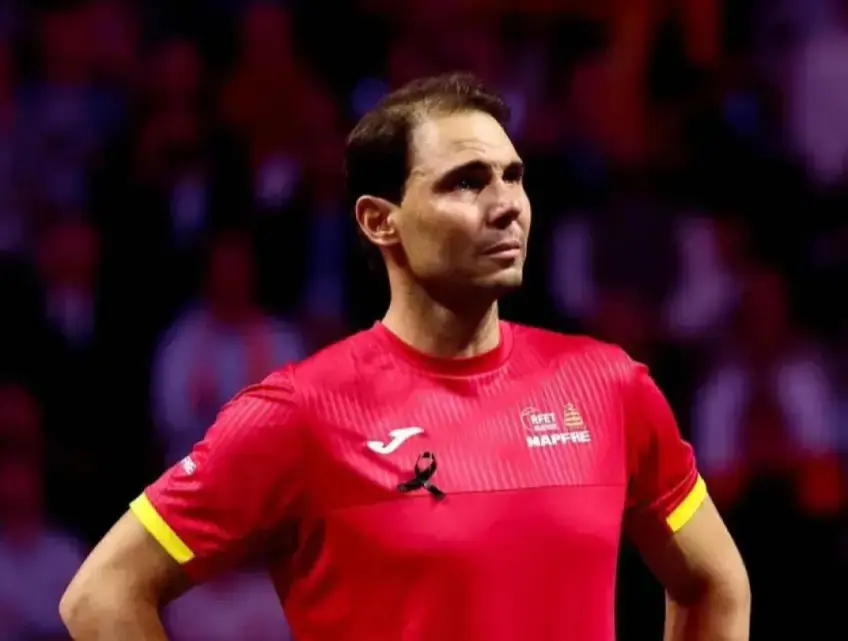I’m Tired of Hearing Same Things Over and Over again as Raducanu is threatened after French Open Hammering as reports claims that…

Introduction: The Cycle of Criticism
Emma Raducanu, the British tennis sensation who captured hearts with her stunning victory at the 2021 US Open, has found herself at the center of a challenging narrative since that triumph. The repetitive cycle of criticism she faces has raised questions about the impact of public perception on young athletes, particularly during her recent struggles at the French Open. As a rising star, Raducanu’s performances are scrutinized not only for their technical merits but also within the context of high expectations set by fans and media alike.
This emphasis on results can be overwhelmingly intense, as Raducanu navigates the pressures of a professional career while still in her teens. Critics often rehash her past achievements, contrasting them with her current form, which can create a dissonant experience for both the athlete and her supporters. The relentless nature of the media coverage can rapidly shift from praise to critique, reflecting societal tendencies to celebrate and subsequently tear down public figures. Moreover, this scrutiny can significantly influence her development, both on and off the court.
As Raducanu confronts this ongoing cycle of criticism, the emotional toll on her mental health becomes increasingly evident. Young athletes, particularly those in high-stakes environments like professional tennis, can experience heightened stress and anxiety due to public expectations. The critiques not only affect their performance but also their self-perception and overall well-being. It is essential to recognize the importance of fostering a supportive environment that prioritizes mental health while allowing space for growth and resilience. Understanding these dynamics is crucial for appreciating the complexities faced by promising talents like Raducanu amidst the pressures of elite competition.
Analyzing the Recent French Open Performance
Emma Raducanu’s recent performance at the French Open highlighted both the challenges she faces as a rising young star in the tennis world and the high expectations that accompany her talent. In a match that concluded with a heavy defeat, Raducanu struggled against her opponent, ultimately succumbing in straight sets. This loss has intensified scrutiny around her performance and mental resilience, especially given her relatively short career trajectory.
Statistically, the match presented a stark contrast between the two players. Raducanu recorded a significantly higher number of unforced errors—an indication of her struggles to maintain composure and accuracy under pressure. Furthermore, her first serve percentage was unusually low, which directly impacted her service games and compounded her difficulties during critical moments. One pivotal moment occurred early in the second set when she was unable to convert two break point opportunities. This failure to capitalize on key chances shifted the momentum and allowed her opponent to consolidate their advantage.
Following this defeat, Raducanu’s ranking took a hit, igniting discussions about her current trajectory and the weight of expectations that come with her previous successes. The mental toll of this match raises questions about her resilience and mental fortitude, essential attributes for any athlete experiencing high-pressure situations, particularly at prominent tournaments like the French Open. Contextually, Raducanu is still in the nascent stages of her professional career, and such setbacks, while disheartening, can serve as critical learning experiences. By reflecting on this challenging match, Raducanu can identify areas for improvement and strengthen her psychological approach to the game. As she continues to navigate through her career, the lessons learned from defeats like this will be instrumental in her development as a player.
The Impact of Media Narrative on Athletes
The role of media narratives in shaping the public perception of athletes cannot be overstated. For athletes like Emma Raducanu, the intensity of coverage can significantly impact their self-esteem and performance on the court. Media outlets often focus on specific storylines relentlessly, creating a narrative that can either bolster or undermine an athlete’s confidence. The case of Raducanu is particularly illustrative; following her remarkable US Open victory in 2021, the media spotlight was bright, and the expectations escalated quickly. This intense scrutiny can lead to a “pressure cooker” environment, where young athletes may feel they cannot fail.
In many instances, the media tends to emphasize an athlete’s struggles more than their achievements. This has been evident in various sports and has created a pattern where young sports professionals face undue pressure stemming from external commentary. Such narratives can lead athletes to internalize criticism or feel inadequate in moments of challenge. Other athletes, like Naomi Osaka or Coco Gauff, have faced similar media-driven scrutiny, highlighting their struggles and mental health challenges rather than emphasizing their accomplishments or resilience. These stories often lead to excessive pressure rather than constructive support, which can affect performance and self-esteem.
Moreover, the psychological implications of persistent media narratives extend beyond immediate performance. The portrayal of perfection and resilience in competitive sports can lead to a skewed perception of success, especially for young athletes. Such narratives often neglect the fact that setbacks are part of growth and development. For Raducanu and her peers, managing this pressure is crucial for their mental well-being, and the media must balance its storytelling to foster a more supportive environment. Only by acknowledging the complexity of an athlete’s journey can the media play a constructive role in their narrative, ultimately benefiting both the audience and the athletes themselves.
Raducanu’s Response and Future Outlook
Emma Raducanu’s journey through the competitive landscape of professional tennis has been an emotionally charged experience, particularly in the wake of increased scrutiny following the French Open. The young athlete has openly discussed the impact of external critiques on her mental well-being, demonstrating a mature approach to the pressures of high-stakes competition. Instead of succumbing to negativity, Raducanu has expressed her determination to utilize criticism as a catalyst for growth and improvement. She acknowledges that every feedback, whether positive or negative, can enhance her skills and prepare her for future challenges.
Raducanu’s response to the media and public commentary has been notably composed. She articulates the importance of taking a step back to reflect rather than react impulsively. This thoughtful contemplation allows her to assess the validity of the critiques wisely. Engaging in open dialogues with her coaches and mentors has been pivotal in shaping her perspective. Such interactions provide her with a framework to not only confront challenges but also to evolve as a competitor. Raducanu’s commitment to learning from each experience, including setbacks, is indicative of her professional maturity.
Looking ahead, Raducanu has expressed her ambition to remain competitive in upcoming tournaments. She aims to refine her technique while fostering a strong mental game, understanding that resilience plays a critical role within high-pressure environments. Goals such as enhancing her physical conditioning and strategic play are part of her preparatory roadmap. Fans and analysts can expect to see an evolved player, one who embraces her journey and demonstrates unwavering resolve. As she continues to adapt amidst critiques, Raducanu’s career trajectory holds promise, and her resilience may well become her defining attribute in the world of tennis.



Leave a Comment